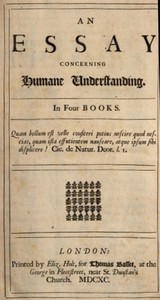An Essay Concerning Humane Understanding, Volume 1 by John Locke
"An Essay Concerning Humane Understanding, Volume 1" by John Locke is a philosophical treatise written during the late 17th century. The work mainly explores the nature of human understanding, asserting that individuals are born without innate ideas and instead acquire knowledge through experience and reflection. The opening of the essay introduces the central theme, where Locke emphasizes the importance of examining human understanding itself as a means to attain knowledge. He argues
against the notion of innate principles, suggesting that our knowledge is built from sensory experience and the workings of our mind, rather than being pre-engraved in us from birth. In the initial chapters, he outlines his method of inquiry, focusing on the origins of ideas and the distinctions between knowledge, belief, and opinion. Locke proposes that a clearer understanding of human cognition can lead to more effective engagement with the world around us. (This is an automatically generated summary.)
Read or download for free
| How to read | Url | Size | |||
|---|---|---|---|---|---|
| Read now! | https://www.gutenberg.org/ebooks/10615.html.images | 873 kB | |||
| EPUB3 (E-readers incl. Send-to-Kindle) | https://www.gutenberg.org/ebooks/10615.epub3.images | 531 kB | |||
| EPUB (older E-readers) | https://www.gutenberg.org/ebooks/10615.epub.images | 533 kB | |||
| EPUB (no images, older E-readers) | https://www.gutenberg.org/ebooks/10615.epub.noimages | 415 kB | |||
| Kindle | https://www.gutenberg.org/ebooks/10615.kf8.images | 713 kB | |||
| older Kindles | https://www.gutenberg.org/ebooks/10615.kindle.images | 671 kB | |||
| Plain Text UTF-8 | https://www.gutenberg.org/ebooks/10615.txt.utf-8 | 849 kB | |||
| Download HTML (zip) | https://www.gutenberg.org/cache/epub/10615/pg10615-h.zip | 795 kB | |||
| There may be more files related to this item. | |||||
About this eBook
| Author | Locke, John, 1632-1704 |
|---|---|
| Title |
An Essay Concerning Humane Understanding, Volume 1 MDCXC, Based on the 2nd Edition, Books 1 and 2 |
| Note | Wikipedia page about this book: https://en.wikipedia.org/wiki/An_Essay_Concerning_Human_Understanding |
| Credits | Steve Harris and David Widger |
| Reading Level | Reading ease score: 49.8 (College-level). Difficult to read. |
| Language | English |
| LoC Class | B: Philosophy, Psychology, Religion |
| Subject | Knowledge, Theory of -- Early works to 1800 |
| Category | Text |
| EBook-No. | 10615 |
| Release Date | Jan 1, 2004 |
| Most Recently Updated | Nov 13, 2022 |
| Copyright Status | Public domain in the USA. |
| Downloads | 5553 downloads in the last 30 days. |
| Project Gutenberg eBooks are always free! | |

